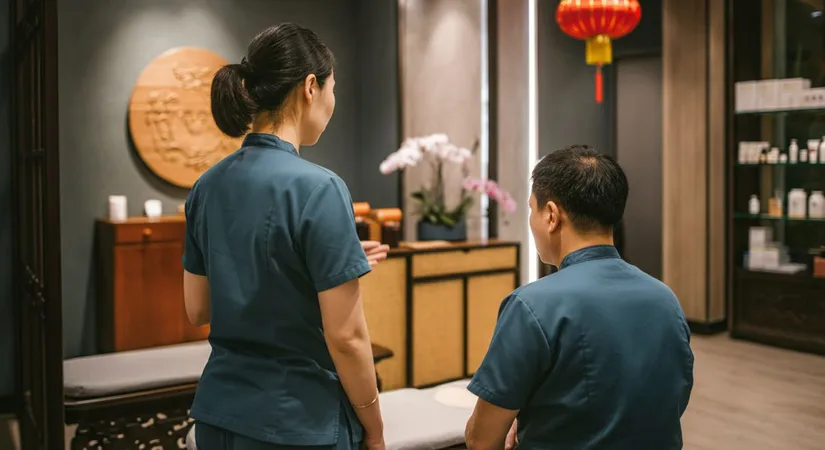Discover Eastern Medicine Near Me: Unlocking Holistic Healing
Explore the benefits of Eastern medicine near you. From acupuncture therapy to herbal remedies, unlock holistic healing today.
Traditional Chinese Medicine (TCM) and other Eastern medical practices have intrigued global audiences with their holistic approaches that focus on the mind, body, and spirit. As more individuals seek alternative health solutions, Eastern medicine offers a compelling blend of ancient wisdom and modern therapeutic applications. This guide unveils the rich tapestry of Eastern medicine practices available near you, highlighting the benefits and insights these traditional methods offer.
Exploring the Principles of Traditional Chinese Medicine
Core Concepts of Traditional Chinese Medicine
Traditional Chinese Medicine (TCM) is grounded in the belief that health is achieved by maintaining the body's balance of Yin and Yang. This balance is crucial for the smooth flow of Qi, or life energy, which is believed to circulate through pathways called meridians. When Qi is blocked or unbalanced, illness can occur.
TCM employs various diagnostic techniques to assess a person's health. For instance, pulse reading involves examining the quality, rhythm, and strength of the pulse at different points on the wrist. This technique provides insights into the state of internal organs and the overall balance of Qi.
Tongue examination is another diagnostic method used in TCM. Practitioners observe the color, shape, and coating of the tongue to identify imbalances. A pale tongue might indicate a deficiency in Qi or blood, while a red tongue could suggest excess heat in the body.
Key Practices in Traditional Chinese Medicine
- Herbal Remedies: TCM uses a vast array of herbs to restore balance and treat various conditions. Each herb is chosen based on its properties and the specific needs of the patient.
- Acupuncture Therapy: This practice involves inserting thin needles into specific points on the body to unblock Qi and promote healing. It is commonly used for pain relief and stress management.
- Exercise and Movement: Practices like Tai Chi and Qigong are integral to TCM, focusing on gentle movements and breathing exercises to enhance Qi flow and improve overall health.
These practices are not only aimed at treating illnesses but also at preventing them by maintaining the body's natural balance. TCM emphasizes a holistic approach, considering the physical, emotional, and environmental factors that influence health.
- Initial Consultation: The practitioner conducts a thorough assessment, including pulse reading and tongue examination, to understand the patient's condition.
- Personalized Treatment Plan: Based on the diagnosis, a tailored plan is developed, incorporating herbal remedies, acupuncture, and lifestyle recommendations.
- Ongoing Evaluation: The patient's progress is regularly monitored, and adjustments are made to the treatment plan as needed to ensure optimal results.
By integrating these practices, TCM offers a comprehensive approach to health and wellness, focusing on the root causes of ailments rather than just the symptoms. This holistic perspective is what sets TCM apart from many other medical systems.

Acupuncture Therapy: How It Works and Its Health Benefits
Understanding the Mechanisms of Acupuncture
Acupuncture therapy, a key component of Eastern medicine, operates on the principle of restoring the flow of Qi through the body. This ancient practice involves inserting fine needles into specific points, known as acupoints, to balance energy and promote healing.
Scientific studies suggest that acupuncture stimulates the nervous system, releasing chemicals in the muscles, spinal cord, and brain. These biochemical changes may enhance the body's natural healing abilities and promote physical and emotional well-being.
For example, acupuncture has been shown to increase the production of endorphins, the body's natural painkillers, which can help alleviate chronic pain conditions. Additionally, it may influence the autonomic nervous system, reducing stress and promoting relaxation.
Applications of Acupuncture in Modern Health
- Pain Management: Acupuncture is widely used to treat various pain conditions, including migraines, arthritis, and back pain, by targeting specific acupoints to relieve discomfort.
- Stress Reduction: By promoting relaxation and reducing stress hormones, acupuncture can help manage anxiety and improve mental health.
- Enhanced Wellbeing: Regular acupuncture sessions may boost overall health by improving sleep quality, enhancing digestion, and supporting immune function.
Acupuncture's versatility makes it a valuable tool in integrative medicine, offering complementary benefits alongside conventional treatments. Its holistic approach addresses not only physical symptoms but also emotional and psychological aspects, contributing to comprehensive health care.
- Initial Assessment: The practitioner evaluates the patient's health history and current symptoms to determine the appropriate acupoints for treatment.
- Needle Insertion: Fine needles are gently inserted into selected acupoints, where they remain for 15 to 30 minutes to stimulate energy flow.
- Follow-up Sessions: Regular sessions are scheduled to monitor progress and adjust the treatment plan as needed to achieve optimal results.
By integrating acupuncture into modern health practices, individuals can experience a balanced approach to wellness that addresses both the root causes and symptoms of various health issues.

Finding the Best Eastern Medicine Practitioners Near You
Evaluating Practitioner Credentials and Philosophies
When searching for "eastern medicine near me," it's crucial to evaluate practitioners' credentials and treatment philosophies. Qualified professionals often hold certifications from recognized institutions, ensuring they meet industry standards. For example, a licensed acupuncturist should have completed extensive training and passed national board exams.
Understanding a practitioner's treatment philosophy is equally important. Some may focus on traditional Chinese medicine, emphasizing holistic healing and herbal remedies, while others might integrate modern techniques. This diversity allows patients to choose a practitioner whose approach aligns with their health goals.
For instance, a practitioner specializing in acupuncture therapy might emphasize its benefits for stress relief and pain management. Another might focus on the broader spectrum of eastern medicine benefits for health, including dietary and lifestyle adjustments.
Steps to Identify Reputable Practitioners
- Research Credentials: Verify the practitioner's certifications and affiliations with professional bodies to ensure credibility.
- Explore Treatment Approaches: Understand their philosophy and methods to see if they match your health needs and preferences.
- Seek Recommendations: Ask for referrals from friends or healthcare providers who have experience with eastern medicine.
By following these steps, you can find the best eastern medicine practitioners near you, ensuring a supportive and effective treatment journey.
Key Considerations for Choosing a Practitioner
- Experience and Specialization: Look for practitioners with extensive experience in specific areas like acupuncture or herbal medicine.
- Patient Reviews: Consider feedback from previous patients to gauge satisfaction and treatment effectiveness.
- Consultation Process: Evaluate their initial consultation approach to ensure it is thorough and personalized.
These considerations help ensure that you select a practitioner who is not only qualified but also a good fit for your personal health journey, enhancing the potential benefits of eastern medicine.
Exploring Herbal Remedies and Alternative Medicine for a Healthy Life
Integrating Herbal Medicine into Daily Health Practices
Herbal medicine, a fundamental aspect of Eastern medical traditions, utilizes natural ingredients to promote healing and wellness. Incorporating herbs into your daily routine can offer both preventive and curative health benefits. For instance, ginseng is renowned for boosting energy and enhancing cognitive function, making it a popular choice for those seeking mental clarity.
Another example is turmeric, which contains curcumin, a compound with potent anti-inflammatory properties. Regular consumption of turmeric can help manage chronic inflammation and support joint health. Additionally, ginger is widely used to aid digestion and alleviate nausea, showcasing the diverse applications of herbal remedies.
Statistics indicate that approximately 80% of the global population relies on herbal medicine for some aspect of primary health care. This widespread use underscores the importance of understanding and utilizing these natural resources effectively.
Benefits of Herbal Remedies in Modern Health
- Natural Healing: Herbal remedies offer a natural approach to healing, minimizing the risk of side effects associated with synthetic drugs.
- Holistic Approach: These remedies address the root causes of health issues, promoting overall well-being rather than just symptom relief.
- Accessibility: Many herbs are readily available and can be easily incorporated into daily diets or used as supplements.
By understanding the benefits and applications of herbal medicine, individuals can enhance their health regimens with these powerful natural tools.
- Identify Your Needs: Determine which health issues you want to address with herbal remedies.
- Research Herbs: Learn about different herbs and their specific benefits to find the most suitable options.
- Consult a Professional: Seek guidance from a qualified practitioner to ensure safe and effective use of herbal medicine.
Integrating herbal remedies into your lifestyle can significantly contribute to a healthier, more balanced life, complementing other forms of alternative medicine.
Integrative Approaches in Traditional Chinese Medicine
Finding Trusted Eastern Medicine Practitioners
Frequently Asked Questions
What is Eastern medicine and how does it differ from Western medicine?
How does acupuncture therapy work and what are its health benefits?
What should I consider when choosing the best Eastern medicine practitioners near me?
What are the benefits of integrating herbal remedies into daily health practices?
How can I safely incorporate alternative medicine into my health regimen?
Discover the Art of Healthy Beauty with estethica! Call Now for Your Free Consultation and Begin Your Journey to Confidence.
📞 Speak with Our Experts Today!